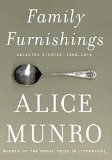
Selected Stories, 1995-2014
by Alice Munro
From the winner of the 2013 Nobel Prize in Literature - and one of our most beloved writers - a new selection of her peerless short fiction, gathered from the collections of the last two decades, a companion volume to Selected Stories (1968-1994).
Family Furnishings brings us twenty-four of Alice Munro's most accomplished, most powerfully affecting stories, many of them set in the territory she has so brilliantly made her own: the small towns and flatlands of southwestern Ontario. Subtly honed with her hallmark precision, grace, and compassion, these stories illuminate the quotidian yet extraordinary particularity in the lives of men and women, parents and children, friends and lovers as they discover sex, fall in love, part, quarrel, suffer defeat, set off into the unknown, or find a way to be in the world.
Peopled with characters as real to us as we are to ourselves, Munro's stories encompass the fullness of human experience - from the wild exhilaration of first love, in "Passion," to the lengths a once-straying husband will go to make his wife happy as her memory fades, in "The Bear Came Over the Mountain." Other stories suggest the punishing consequences of leaving home ("Runaway") or leaving a marriage ("The Children Stay"). The part romantic love plays in one's existence is explored in "Too Much Happiness," based on the life of the noted nineteenth-century mathematician, Sophia Kovalevsky. And in stories that Munro has described as "closer to the truth than usual" - "Dear Life," "Working for a Living," and "Home" among them—we glimpse the author's own life.
As the Nobel Prize presentation speech says in part: "Reading one of Alice Munro's texts is like watching a cat walk across a laid dinner table. A brief short story can often cover decades, summarizing a life, as she moves deftly between different periods. No wonder Alice Munro is often able to say more in thirty pages than an ordinary novelist is capable of in three hundred. She is a virtuoso of the elliptical and the master of the contemporary short story."
"Starred Review. In fact, all that can be expected from these economical, expertly told stories is that they're near peerless, modern literary fiction at its very best." - Kirkus
"Starred Review. The two dozen stories gathered here are drawn from Munro's collections that appeared over the past two decades, this blue-ribbon compilation now joining her previous Selected Stories (1996) in presenting arguably the best of the sterling fiction this personally and professionally unpretentious Canadian has contributed to the world." - Booklist
"Editor's recommendation." - Barnes and Noble
This information about Family Furnishings was first featured
in "The BookBrowse Review" - BookBrowse's membership magazine, and in our weekly "Publishing This Week" newsletter. Publication information is for the USA, and (unless stated otherwise) represents the first print edition. The reviews are necessarily limited to those that were available to us ahead of publication. If you are the publisher or author and feel that they do not properly reflect the range of media opinion now available, send us a message with the mainstream reviews that you would like to see added.
Any "Author Information" displayed below reflects the author's biography at the time this particular book was published.
Alice Munro was born in 1931 in Wingham, a small town in southwestern Ontario, to a family of small farmers. She began writing stories at the age of 12. She won a two-year scholarship to the University of Western Ontario. While at school she published several short stories in the student literary magazine. She left before graduating due to money troubles, and in order to marry another student, James Munro. The Munros raised three daughters and for several years ran a bookshop in Victoria; they eventually divorced and Alice Munro married Gerald Fremlin, a geographer. The Fremlins divide their time between Clinton, Ontario--not far from Munro's hometown of Wingham--and Comox, British Columbia.
She says that the turning point for her writing came in 1959 when she wrote "The Peace of ...
Judge a man by his questions rather than by his answers.
Click Here to find out who said this, as well as discovering other famous literary quotes!
Your guide toexceptional books
BookBrowse seeks out and recommends the best in contemporary fiction and nonfiction—books that not only engage and entertain but also deepen our understanding of ourselves and the world around us.